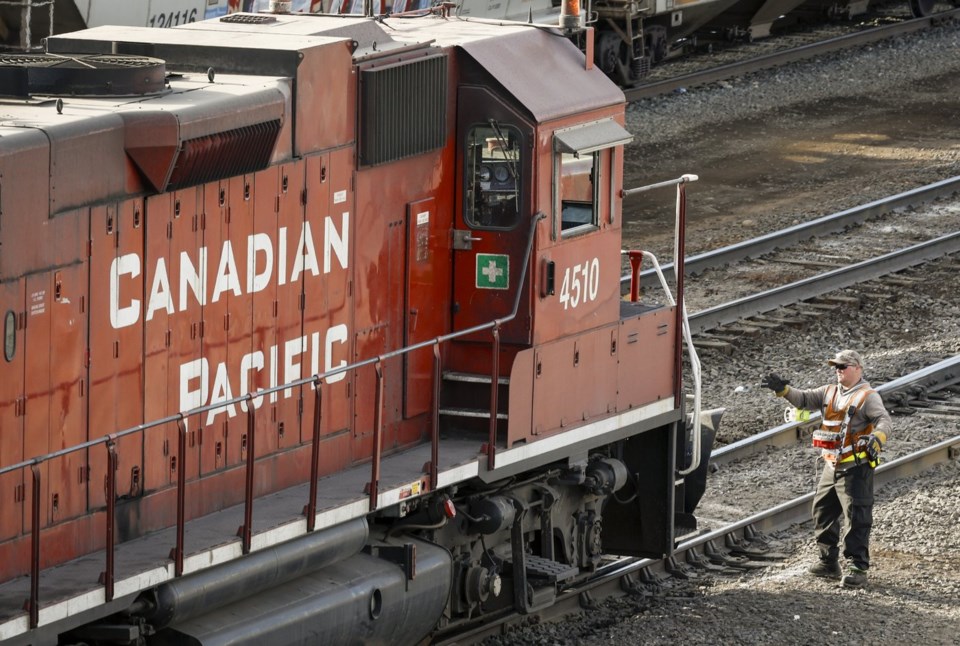MONTREAL — The country's two main railways and their workers remain at loggerheads over scheduling, safety or salaries — depending on who you ask — as the clock ticks down on contract negotiations.
Canadian National Railway Co. and Canadian Pacific Kansas City Ltd. have warned they will lock out employees on Aug. 22 unless they can reach deals with their employees, lending new weight to the threat of a work stoppage that could snarl supply chains countrywide.
The Teamsters Canada Rail Conference, which represents some 9,300 engineers, conductors, yard workers and rail traffic controllers, claimed that CPKC wants to "gut the collective agreement of all safety-critical fatigue provisions."
CN has targeted fewer points linked to fatigue, the Teamsters said, but has proposed what the union called a "relocation scheme" that would see some employees move to far-flung regions for several months at a time to fill labour gaps.
“From the very beginning, rail workers have only ever sought a fair and equitable agreement. Unfortunately, both rail companies are demanding concessions that could tear families apart or jeopardize rail safety,” said Teamsters president Paul Boucher in a statement Friday.
The rail companies see things differently.
"None of CN's offers compromised safety in any way," the Montreal-based railway said in a release Friday. It also said the union has made no counteroffers to its latest proposals.
"What we have proposed is that people can volunteer for relocation when there is a requirement based on availabilities," said CN spokesman Jonathan Abecassis. "To say that this is tearing families apart is just not accurate."
Each railway has put forward two distinct sets of offers, stating they all comply with the law — a point the union has not contested.
The first set overhauls the basis of pay, moving to a scheduled-shift model from one where workers are paid per mile.
The second set stays more within the current contract framework, but with some key changes.
CN's scheduled approach to shifts — a comparable offer was tabled by CPKC before being withdrawn "conditionally" on Friday — would mark a drastic change from the mileage-based system of pay that has been in place for decades at both companies.
If accepted, the new arrangement would make for more predictability for workers and managers, the railways say. But if an employee reached their destination hours ahead of time, it would also mean they could be assigned to other tasks rather than clocking out on arrival.
Meanwhile, the proposal based on a more familiar pay model, which includes wage bumps, could see some CN workers relocate for up to 90 days at a time to where crews are in short supply, the union said.
“It takes the view of workers as pieces of equipment that you can pick up and move across Canada at will, ignoring the fact that people have kids, people have families, people have lives outside of work,” said Teamsters spokesman Christopher Monette.
The time-based proposal would see employees on a scheduled 40-hour work week, with at least 10 or 12 hours of rest between shifts — depending on whether they're at home or away — and either two or three consecutive days off each week.
Meanwhile, CPKC's time-based offer would allow the company to compel crews to work up to 12 hours in a row rather than giving them the option to call it at 10 hours.
CPKC said the sticking points for its other, "status quo" proposal revolve around wages as well as "held-away" pay — income that kicks in after a certain number of hours off-shift in a location that is not the worker's home terminal. The Calgary-based railroad operator wants to push back the start time on that pay, an adjustment made in response to the longer rest-period times mandated by tighter federal regulations.
"The status quo-style offer fully complies with new regulatory requirements for rest and does not in any way compromise safety," CPKC said in a release Friday.
The union claims the proposed deal would make shifts even less predictable by doing away with even a rough idea of when it could start.
In May 2023, new rules came into effect that raised the minimum rest period between shifts to 10 hours at home and 12 hours when away, versus the previous six hours and eight hours, respectively. They also capped freight workers’ maximum shift length at 12 hours, down from 16.
The union has turned down offers of binding arbitration from both railways.
CN says engineers earned $150,000 on average before pension and medical benefits last year, while conductors took in $121,000 on average. CPKC has cited comparable figures.
The union says the majority of workers earn between $90,000 and $110,000.
In a ruling last Friday, the national labour tribunal ordered a 13-day cooling-off period as part of a pair of decisions that deemed rail services non-essential, opening the door to a full-fledged work stoppage as early as next week.
This report by The Canadian Press was first published Aug. 12, 2024.
Companies in this story: (TSX:CNR, TSX:CP)
Christopher Reynolds, The Canadian Press




